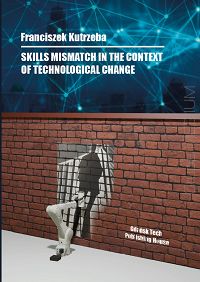Skills Mismatch in the Context of Technological Change
- Add feedback:
- Code: 5066
- Manufacturer: Wydawnictwo Politechniki Gdańskiej
- Autor: Franciszek Kutrzeba
-
-
- pcs.
- Net Price: 23.81 zł 25.00 zł
Skills Mismatch in the Context of Technological Change
rok wydania: 2022, wydanie pierwsze
ISBN: 978-83-7348-863-2
ilość stron: 116
format: B5
oprawa: miękka
Opis
The main purpose of this dissertation is to assess the perception asymmetry of smart skills and formal education in ICT based economy. In other words, the goal of this research is to assess perceptions of smart skills and competences in the context of technological change from the perspectives of employers and students in Poland. Determining the fore-mentioned relationship gives insight into the hypothetical perception asymmetry for demanded smart skills in an ICT-based economy with possible practical implications for policymakers and educators. I have defined the following research questions:
- What is the interrelation of perceptions on smart skills and competences between Polish higher education students and employers in Poland?
- What is the significance of formal education in the context of recent technological change?
Technological change put as the background for this monograph is inevitable. Chance is slow, until it isn't. One day in not so distant future we will all wake up in the full swing of the 4th Industrial Revolution with cyber-physical systems forcing its way into every aspect of our lives including smart homes, smart cities, environment and nature, green energy, food, medicine, automotive, aerospace and aviation, telecommunication, and so on. In a new semantic society, when it emerges, the day-to-day mechanisms of trade, work, bureaucracy and our daily lives will be handled by machines talking to machines replacing a large number of our human skills. This is somewhat fearful perspective, and a huge challenge, dened for the rst time as early as in 1930 by John Keynes who put it as follows: "We are being a‑icted with a new disease of which some readers may not have been heard the name, but of which they will hear a great deal in the years to come — namely, technological unemployment".
This "disease" dened by Keynes is today just around a corner; research suggests that over 50% of today's jobs will be replaced or seriously disrupted in the next decade. Thus, it has never been more important to address the skills that we should learn to survive this inevitable technological change.
The proposed volume addresses the above dened challenge and represents the important and urgently needed rigorous research eort identifying combination of skills essential to successful performance in the approaching Society 4.0. The overall, and in my opinion the most important, aim this monograph is to deny the set of skills machines can't replace. Although the learning of new technologies will still be important, the skills equation will shift, with increased importance given to the value of soft/intelligent skills. The most successful people in the future will be those who develop the human traits that cannot be automated. Empathy, critical thinking, collaboration, creativity and relationships cannot be automated.
prof. Edward Szczerbicki
University of Newcastle, Australia
Gdansk University of Technology
Spis treści
List of abbreviations / 7
Glossary / 8
1. Introduction / 9
1.1. Technological change and the character of work / 9
1.2. Higher education and skills mismatch / 10
1.3. The research problem, purpose and objectives / 13
1.4. The structure / 16
2. Technological change and the future of skills / 17
2.1. Aspects of technology / 17
2.2. Technological change / 20
2.3. Technology diffusion / 24
2.4. Future skills and the changing character of work / 28
3. Skills and competences / 31
3.1. Smart skills / 34
3.2. Various aspects of the same phenomenon / 36
3.3. Skills and the Polish labor market / 40
3.4. Skill and routine biased technical change / 44
4. Skill and competence development in higher education / 46
4.1. Approaches / 46
4.2. Higher education and its mission in Poland / 47
4.3. Recent changes / 49
4.4. Returns on education / 53
5. Research design and methological approach / 55
5.1. Research approach and materials / 55
5.2. Target population and sample selection / 58
5.3. Data collection / 59
5.4. Knowledge creation – a conceptualization / 62
5.4.1. Practical implications / 67
5.5. Limitations / 68
6. Results / 69
6.1. The pilot study / 69
6.2. Results: the survey on students / 73
6.3. Results: the survey on employers 80
7. Discussion and conclusions/ 84
7.1. Findings / 84
7.1.1. Formal education and work experience / 85
7.1.2. Smart skills / 86
Appendices / 90
BIBLIOGRAPHY / 96
List of tables and figures / 115


